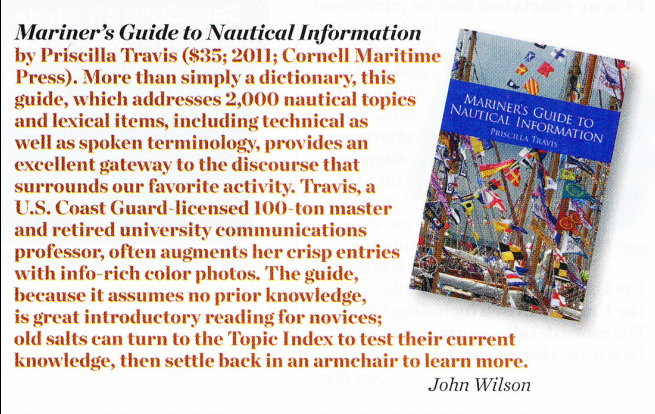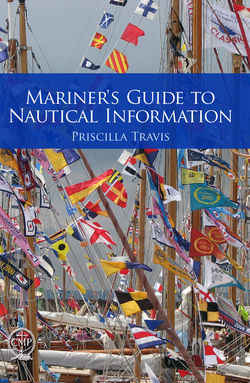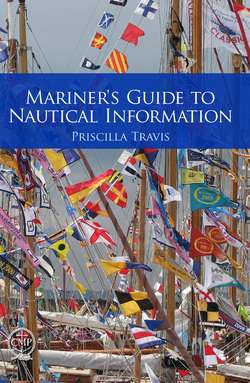REVIEWS

CRUISING WORLD, March 2013, p. 18

Mariner’s Guide to Nautical Information
By Priscilla Travis
Cornell Maritime Press,
A Division of Schiffer Publishing, Ltd.
2011, Hardcover, 544 pages
It is rare in this digital age that we reach for a book when trying to understand or clarify a term or concept. Dictionary and glossary entries are usually instantly available in just a few keystrokes. But when it comes to quick access to nautical terminology, a quick flip through Priscilla Travis’s Mariner’s Guide to Nautical Information can serve up the answers in about as much time as it takes to type in the word Google. Her alphabetically organized glossary of nautical terms, ranging from common to obscure, are easily navigated with well-written definitions and when warranted, well-illustrated.
From “Abbreviations” to “Zulu Time,” the entries are presented with both the novice and seasoned salt in mind. Many go beyond simple definitions to offer solid advice. For example, under the entry for “Boat Names” she writes, “... should be short and simple,” pointing out that they should be easy to spell in the phonetic alphabet and certainly not be mistaken for a distress call. Any name that sounds like “Mayday” (imagine a yacht called Payday) is clearly a poor choice.
There is advice on everything from boat hooks to AIS and ECDIS. In addition to the comprehensive glossary, Travis also includes a basic boating library, annotated bibliography and easily searched topic index. You will be hard pressed to find a more comprehensive guide to all things nautical.
www.oceannavigator.com January/February 2012
By Priscilla Travis
Cornell Maritime Press,
A Division of Schiffer Publishing, Ltd.
2011, Hardcover, 544 pages
It is rare in this digital age that we reach for a book when trying to understand or clarify a term or concept. Dictionary and glossary entries are usually instantly available in just a few keystrokes. But when it comes to quick access to nautical terminology, a quick flip through Priscilla Travis’s Mariner’s Guide to Nautical Information can serve up the answers in about as much time as it takes to type in the word Google. Her alphabetically organized glossary of nautical terms, ranging from common to obscure, are easily navigated with well-written definitions and when warranted, well-illustrated.
From “Abbreviations” to “Zulu Time,” the entries are presented with both the novice and seasoned salt in mind. Many go beyond simple definitions to offer solid advice. For example, under the entry for “Boat Names” she writes, “... should be short and simple,” pointing out that they should be easy to spell in the phonetic alphabet and certainly not be mistaken for a distress call. Any name that sounds like “Mayday” (imagine a yacht called Payday) is clearly a poor choice.
There is advice on everything from boat hooks to AIS and ECDIS. In addition to the comprehensive glossary, Travis also includes a basic boating library, annotated bibliography and easily searched topic index. You will be hard pressed to find a more comprehensive guide to all things nautical.
www.oceannavigator.com January/February 2012
Mariner's Guide to Nautical Information

By Priscilla Travis
Published by Cornell Maritime Press
543 pages
hardcover $35
Priscilla Travis has compiled more than 2,000 nautical topics and terms into the Mariner’s Guide to Nautical Information, a reference book that belongs in every sailor’s library. Subjects, including the Navigation Rules, cruising under sail and power, electronics, communication, safety, weather and nautical language, are arranged alphabetically, a “Basic Boating Library” appendix lists the essential titles that every boater should own, and the extensive bibliography identifies hundreds of relevant publications and online resources. Whether you are a novice or have lots of sea miles in your logbook, this book has a wealth of information to help you to be more competent, confident and comfortable afloat. Topics like safety and the Rules of the Road are emphasized, and the author provides full explanation of complex subjects. Two full pages, for example, are devoted to “Marine Insurance.” The 173 color photographs that accompany the informative text (most of which appear to have been taken during the author’s mostly-solo circumnavigation of the British Isles) are superb, and there are also several line drawings.
Priscilla Travis has been sailing for more than 35 years, logging 85,000 miles along the East Coast of North America and in the waters of northwestern Europe, with more than 4,000 miles as solo skipper. A resident of Chester, MD, she holds a U.S. Coast Guard 100 Ton Master’s license.
The Mariner’s Guide to Nautical Information is highly recommended, and it can be purchased at your local bookseller or favorite online retailer, or directly from the publisher at schifferbooks.com.
http://windcheckmagazine.com. Review http://tinyurl.com/ct8mzmr.
American Boat and Yacht Council (ABYC) review included with a special promotion for its members only:
"What do ABYC, overfalls, sailmaker's palms and baggywrinkles have in common? They are all marine terms or expressions defined in Priscilla Travis’ new information packed book, Mariner’s Guide to Nautical Information. No library is complete without this 544 page volume of familiar and, even more importantly, the unfamiliar lingo of accomplished mariners. Place your order today and tune up your nautical vocabulary."
http://abyc.com.
Published by Cornell Maritime Press
543 pages
hardcover $35
Priscilla Travis has compiled more than 2,000 nautical topics and terms into the Mariner’s Guide to Nautical Information, a reference book that belongs in every sailor’s library. Subjects, including the Navigation Rules, cruising under sail and power, electronics, communication, safety, weather and nautical language, are arranged alphabetically, a “Basic Boating Library” appendix lists the essential titles that every boater should own, and the extensive bibliography identifies hundreds of relevant publications and online resources. Whether you are a novice or have lots of sea miles in your logbook, this book has a wealth of information to help you to be more competent, confident and comfortable afloat. Topics like safety and the Rules of the Road are emphasized, and the author provides full explanation of complex subjects. Two full pages, for example, are devoted to “Marine Insurance.” The 173 color photographs that accompany the informative text (most of which appear to have been taken during the author’s mostly-solo circumnavigation of the British Isles) are superb, and there are also several line drawings.
Priscilla Travis has been sailing for more than 35 years, logging 85,000 miles along the East Coast of North America and in the waters of northwestern Europe, with more than 4,000 miles as solo skipper. A resident of Chester, MD, she holds a U.S. Coast Guard 100 Ton Master’s license.
The Mariner’s Guide to Nautical Information is highly recommended, and it can be purchased at your local bookseller or favorite online retailer, or directly from the publisher at schifferbooks.com.
http://windcheckmagazine.com. Review http://tinyurl.com/ct8mzmr.
American Boat and Yacht Council (ABYC) review included with a special promotion for its members only:
"What do ABYC, overfalls, sailmaker's palms and baggywrinkles have in common? They are all marine terms or expressions defined in Priscilla Travis’ new information packed book, Mariner’s Guide to Nautical Information. No library is complete without this 544 page volume of familiar and, even more importantly, the unfamiliar lingo of accomplished mariners. Place your order today and tune up your nautical vocabulary."
http://abyc.com.
Amazon.com Purchaser Review
An amazing compendium, October 20, 2011
By Hannah Gardner "HGardner" (Chesapeake Bay)
(Amazon Verified Purchase)
This review is from: Mariner's Guide to Nautical Information (Hardcover)
One of the clearest and obviously the most comprehensive of nautical reference books. What sets it apart is the completeness, conciseness and usefulness of the entries. The abandon ship procedures says in what is probably fewer than 200 words, exactly what every captain who goes offshore needs to know. And four short paragraphs on frontal systems are a surprisingly useful guide to the weather. Throughout this book are guides to everything a sailor -- whether novice or salty -- needs to know about anchoring, sailing at wind angles and literally thousands of other subjects. I recommend this book highly.
By Hannah Gardner "HGardner" (Chesapeake Bay)
(Amazon Verified Purchase)
This review is from: Mariner's Guide to Nautical Information (Hardcover)
One of the clearest and obviously the most comprehensive of nautical reference books. What sets it apart is the completeness, conciseness and usefulness of the entries. The abandon ship procedures says in what is probably fewer than 200 words, exactly what every captain who goes offshore needs to know. And four short paragraphs on frontal systems are a surprisingly useful guide to the weather. Throughout this book are guides to everything a sailor -- whether novice or salty -- needs to know about anchoring, sailing at wind angles and literally thousands of other subjects. I recommend this book highly.